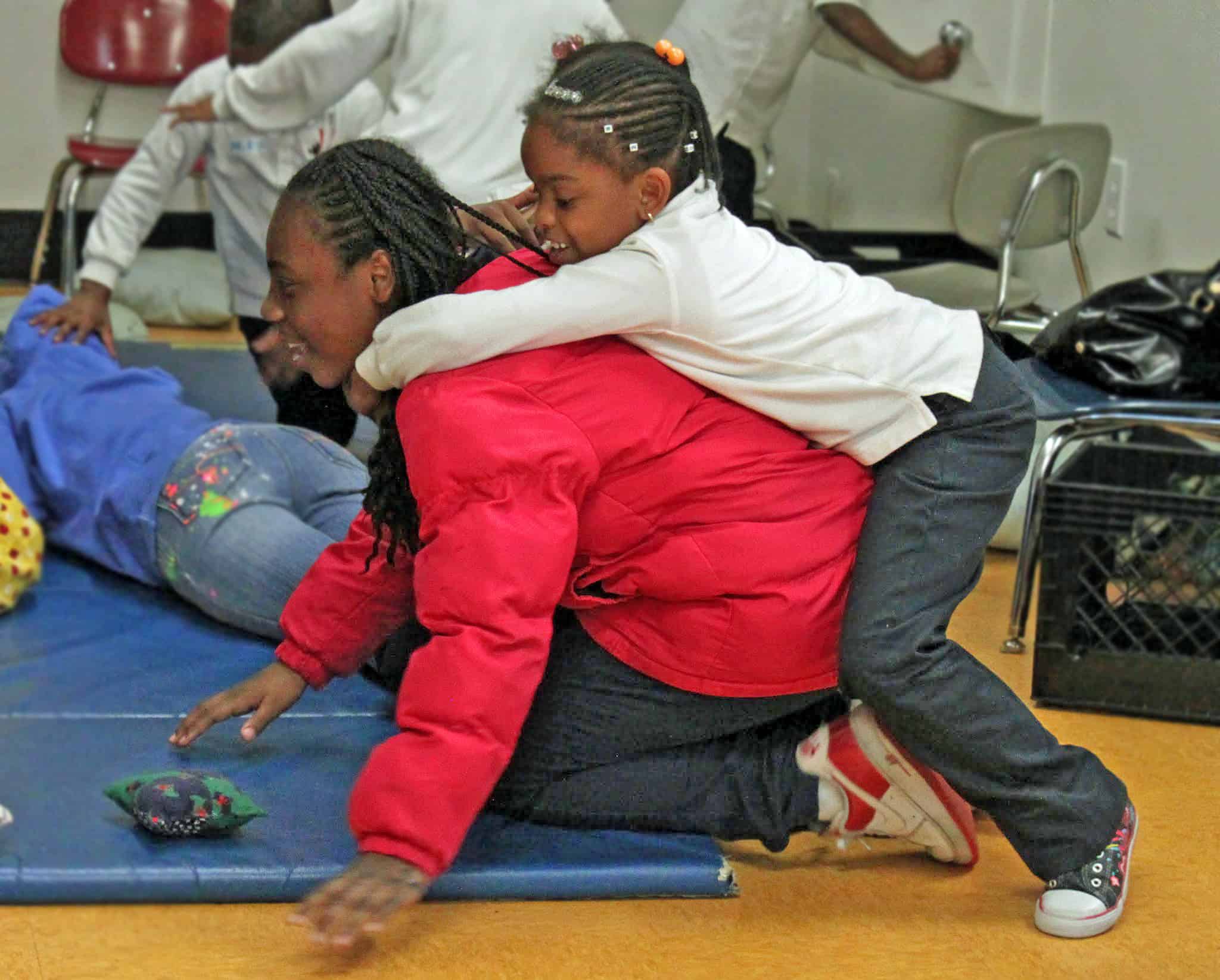What can we parents do to help our children build resilience, so they can bounce back after adversity? This may be one of the key questions in parenting. We can’t entirely protect our children from difficult times. If they’re learning, having adventures, and growing well, they’ll experience downturns and disappointments as a matter of course. We want our children to have a reservoir of confidence they can tap to bring them through hardship well. So what do we do when our child collapses in feelings of defeat, whether he heard unkind words from a friend today, or faces the hardships of a serious illness day in and day out?
Feeling close to one dependable adult is at the heart of building resilience for children
Studies have shown that if just one person in a child's life is consistently supportive, a child is much more likely to emerge stronger from a daunting situation. Just one person who is enthusiastic about that child. Just one person who lights up when that child walks into the room. This is a simple observation, but in the whirl of activities that takes place day to day in a family, how do we know we’ve fostered closeness with our child? We juggle many necessary roles–sleep monitor, cleanliness checker, homework prodder, educational guide among them. How do we make sure we’re helping our children actually feel our love? And how do we keep our hearts open enough to show our delight in them when we’re overworked and often worried?
Dedicate time and enthusiasm
Special Time is a simple way to remind our children that we love them. It works especially well when there are persistent irritants in our relationship with them, because it disciplines us to be pleased with each child for a specific period of time. I call Special Time a “listening tool” because it's a reliable way to adopt a listening, accepting, enthusiastic role. Special Time allows your child to actually feel your support!
To do Special Time, set aside a period of time from five to thirty minutes, whatever you can manage. You say, “Hey, tomorrow I'm going to have fifteen minutes after dinner, and we can do whatever you want to do! Think about it, and we'll make it a date!” (If you have older children, you’ll need to set conditions around whether or not you have transportation, whether or not you will spend money, and how much.)
Then, enthusiastically go with whatever activity your child chooses. Jumping on beds, building a fort in the living room, making pancakes, playing catch in the rain outside, making a little “nest” for a stuffed animal. Whatever your child chooses, keep your attention on him. Make lots of eye contact, touch him affectionately, and energetically throw yourself into the play. Set a timer, and don't let anything short of an earthquake interrupt your focus. When the timer goes off, let your child know you loved being with him, and let him know when the next Special Time will be.
What your child chooses will help you understand more about what he loves and what he wants. This is very important communication for you to receive. When your child can show you what he loves while you pay warm attention, he’ll feel closer to you. That closeness is at the heart of resilience. And your child’s delight in having your uninterrupted attention is likely to capture your heart, as well, so that the bond between you becomes stronger.
Listen to the feelings that emerge
Often, Special Time encourages a child to express feelings that he needs to offload. And this brings us to the second factor I think is crucial in building resilience in children. When a child has someone who will listen to his feelings all the way through, he can bounce back from disappointment. He doesn’t have to carry festering upsets day to day or year to year. He can express his hurt feelings and cry or tantrum until he actually feels “done.”
We call this “Staylistening,” because the parent has to make a conscious decision not to try to “fix” the broken cookie or the torn homework paper. The parent offers support, but doesn’t try to “fix” his feelings, or the situation. And when you’ve listened, your child will see his world as shinier and more hopeful afterward. It is a second Listening Tool that is sure to build your child’s resilience every time you use it. You don’t try to think for your child. You don’t lecture him or tell him what’s right and wrong. You allow him to clear away all of his feelings of hurt, with your support. You give him the best of you–his connection with you–as he works through his disappointment or discouragement. He’ll have renewed energy afterward. He may even begin to solve the problem himself, without pushing or prodding from you!
Here's one parent's story of how Special Time and Staylistening can work:
I could tell my seven-year-old daughter was going to “blow” anytime. She was upset at every little thing, elbowing her sister, accidentally tripping her, things like that. So I told her, “Tomorrow we're going to do Special Time, and you can play whatever you want to with me.” She woke up at six in the morning and came in ready to do Special Time! So I got up, and we played this game over and over that she kept winning. She was delighted to win, and I made sure I lost. That was part of the deal.
At one point, my younger daughter came in and wanted my attention. I told her, “This is Zetta's time, and I'm playing with her. You can go with your Daddy.” She didn't want to go, so getting her situated with her Dad took some time. When I came back, I saw Zetta huddled behind the sofa, furiously writing. I asked her, “What are you writing?” She showed me. It said “I hate my sister. She's ugly. I hate curly hair. I don't want her around.” I said, “Good, I'm glad you're writing all this down. Do you hate her?” (I was trying to give her permission to have these feelings.) She told me, “I don't want a sister! I want to give her away. I wish we had never had her!” She went on for a while about how much she didn't like her sister. Then she said, “Would you sit and watch a video with me all the way through?” I never sit with them while they're watching their videos. So I said I would.
She then went into the other room, put the video on, and went and got her sister. She put her sister on the bed, curled up with her, and put her arms around her. Then she said, “Mom, come and sit here. I think you should be right between us, so Annie gets to sit next to you, too.” She moved Annie over, and made a place for me. We sat and cuddled and watched the video together, and she was lovely with her sister the rest of the day.
Children build resilience when someone cares enough to listen to their upsets all the way through, without arguing, trying to be logical, or condemning them for how they feel. The feelings are like a storm passing through—if the lightning can strike and the thunder can roll, the energy of the storm dissipates. If no one listens, the bleak thoughts and bad feelings are stored up, but they become hard to manage and are ready to pop at any little excuse. With regular chances to be heard, respected, and loved through an emotional storm, children come to know that they can get through tough times, unfair times, frustrating times, and lonely times. They know they’ve got the support they need.
Staylistening gives a child a sense that although you don't have the same feelings as they do, you can love them just the same, and stay with them until the feelings change for the better. With listening, the feelings do lift. With listening, problem solving will follow a good, cleansing emotional storm. And your child, if not resilient already, will become so as you Staylisten through necessary upsets that help him clear the feelings he trips over every day as he tries to learn, love, and bounce back from adversity.
We parents need to build support
Of course, to take such generous initiatives toward your child, you need to build your resilience as a parent! Parenting is an emotional ultra-marathon—there's so much to learn and so little help with the work. We recommend that parents set up a Listening Partnership, so you can take turns being listened to and returning the favor for another parent who cares deeply and is trying hard, like you are. All it takes is a simple agreement between two good-hearted people to keep their advice and judgments on a short leash as they take turns listening to one another. Special Time and Staylistening are much easier to do when you've had permission to tell someone your own hopes and disappointments. These Listening Partnerships make a surprising difference in the feel of life as a parent! And they give us a fighting chance to have more fun with our children, an important part of building their backbone and bounce.

